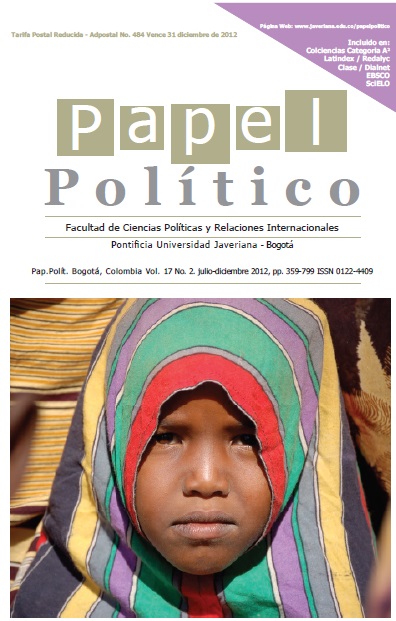Resumo
Una de las variables más importantes para que un conflicto armado interno se internacionalice es la decisión propia de las partes en conflicto para que esto suceda. Por eso, el trabajo se concentró en estudiar las estrategias internacionales que utilizaron los dos actores principales del conflicto colombiano: el Estado y las FARC. La estrategia del Estado colombiano se concentró en la búsqueda de legitimidad y asistencia militar de Estados Unidos, subestimando la importancia geoestratégica de los vecinos para alcanzar una solución a esta problemática, más aún cuando el desarrollo del conflicto armado se ha venido concentrando en las fronteras, de maneraespecial en la suroccidental. Por esto, Ecuador se sintió amenazado, al no tener la suficiente capacidad para controlar la totalidad de su territorio,
situación que utilizó las FARC para buscar también legitimidad y apoyo militar en algunos sectores del poder ecuatoriano. Esto último demuestra que el Estado no solo subestimó la importancia geopolítica de los vecinos, sino que también subestimó la “diplomacia paralela” de las FARC, que buscó copar los espacios dejados por el Estado colombiano. Esta fue, en definitiva, la estrategia de internacionalización de las FARC. El resultado, la tensión política y diplomática que llevó a la ruptura de las relaciones
bilaterales por un poco más de dos años.
Esta revista científica se encuentra registrada bajo la licencia Creative Commons Reconocimiento 4.0 Internacional. Por lo tanto, esta obra se puede reproducir, distribuir y comunicar públicamente en formato digital, siempre que se reconozca el nombre de los autores y a la Pontificia Universidad Javeriana. Se permite citar, adaptar, transformar, autoarchivar, republicar y crear a partir del material, para cualquier finalidad (incluso comercial), siempre que se reconozca adecuadamente la autoría, se proporcione un enlace a la obra original y se indique si se han realizado cambios. La Pontificia Universidad Javeriana no retiene los derechos sobre las obras publicadas y los contenidos son responsabilidad exclusiva de los autores, quienes conservan sus derechos morales, intelectuales, de privacidad y publicidad.
El aval sobre la intervención de la obra (revisión, corrección de estilo, traducción, diagramación) y su posterior divulgación se otorga mediante una licencia de uso y no a través de una cesión de derechos, lo que representa que la revista y la Pontificia Universidad Javeriana se eximen de cualquier responsabilidad que se pueda derivar de una mala práctica ética por parte de los autores. En consecuencia de la protección brindada por la licencia de uso, la revista no se encuentra en la obligación de publicar retractaciones o modificar la información ya publicada, a no ser que la errata surja del proceso de gestión editorial. La publicación de contenidos en esta revista no representa regalías para los contribuyentes.


